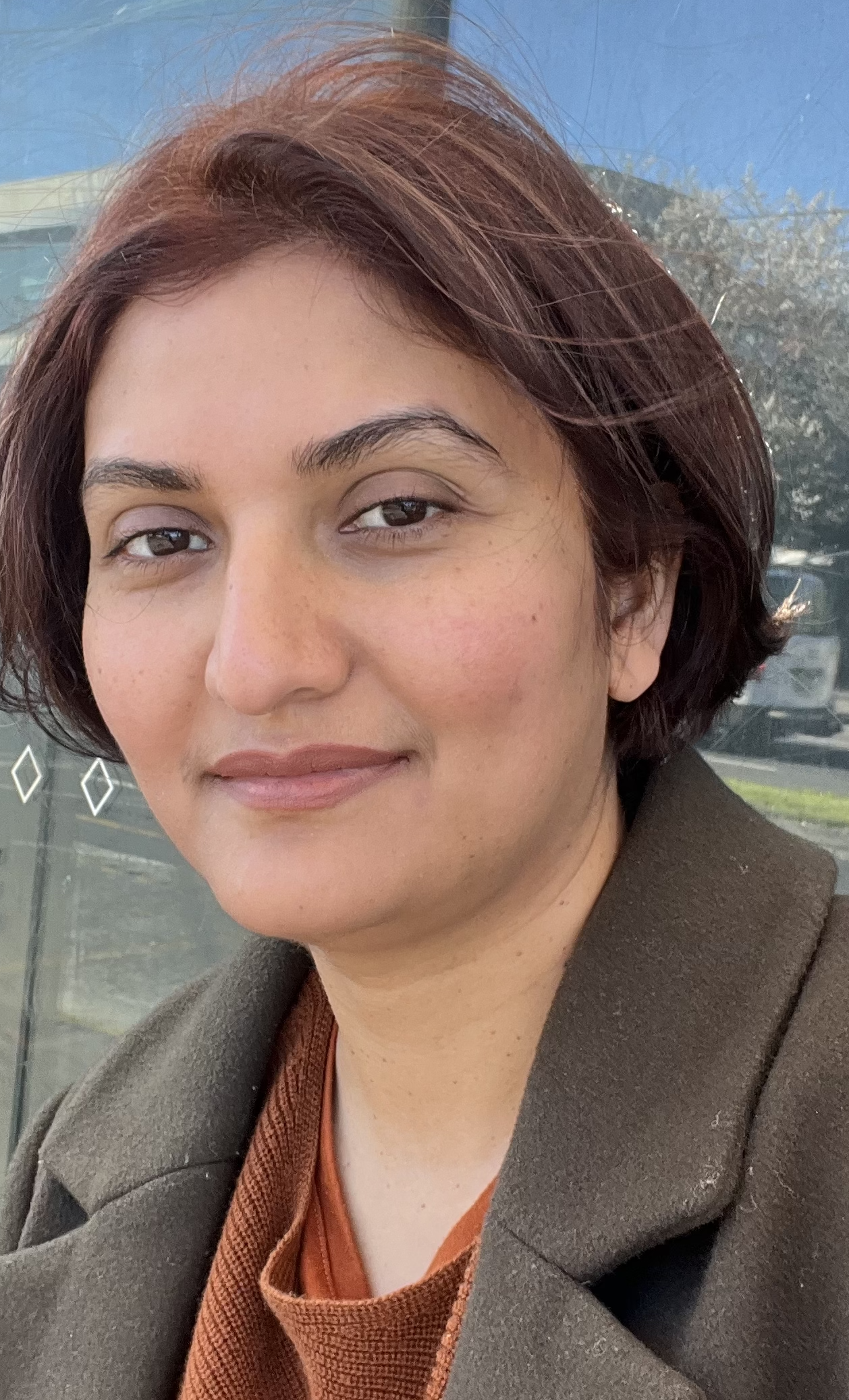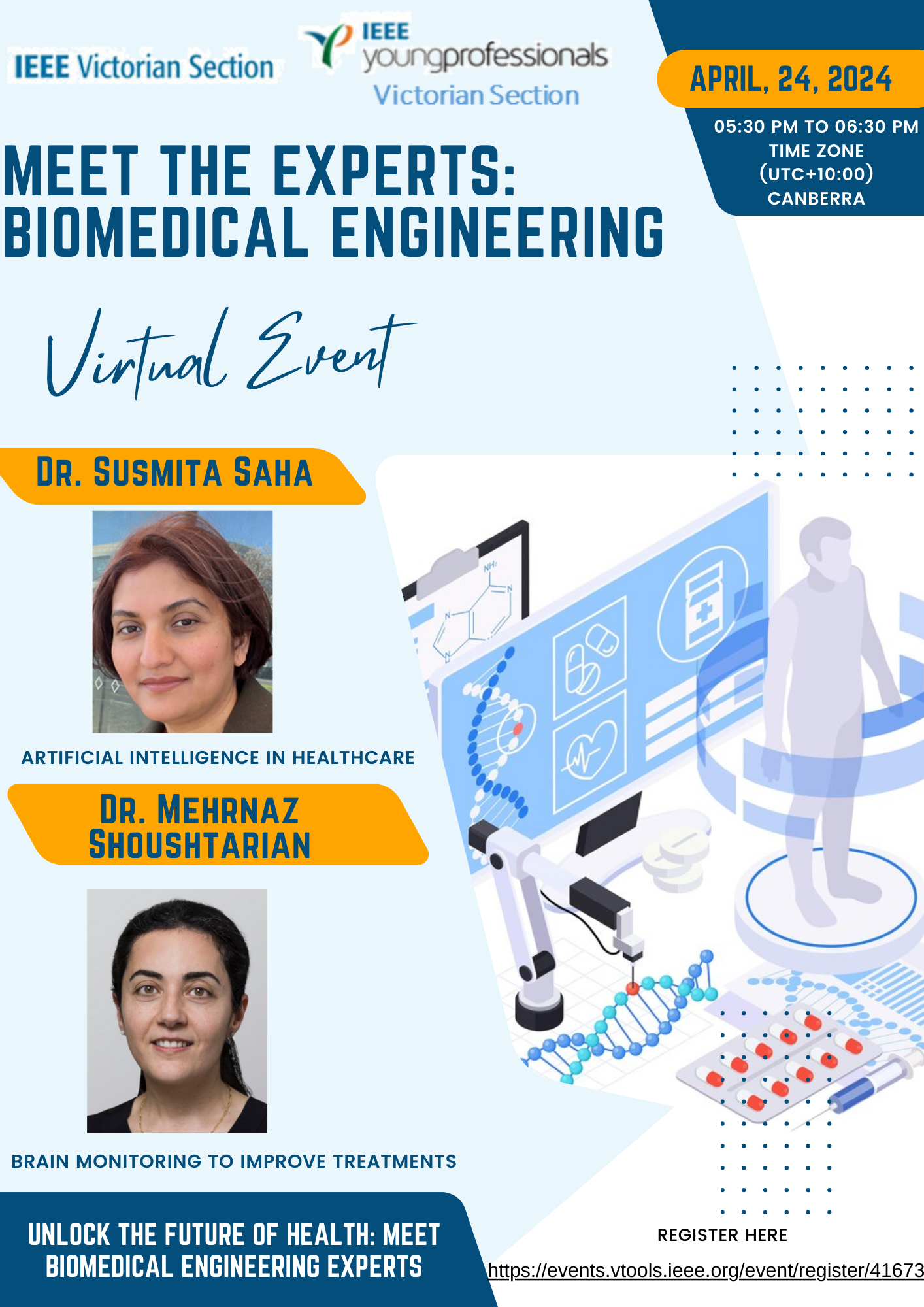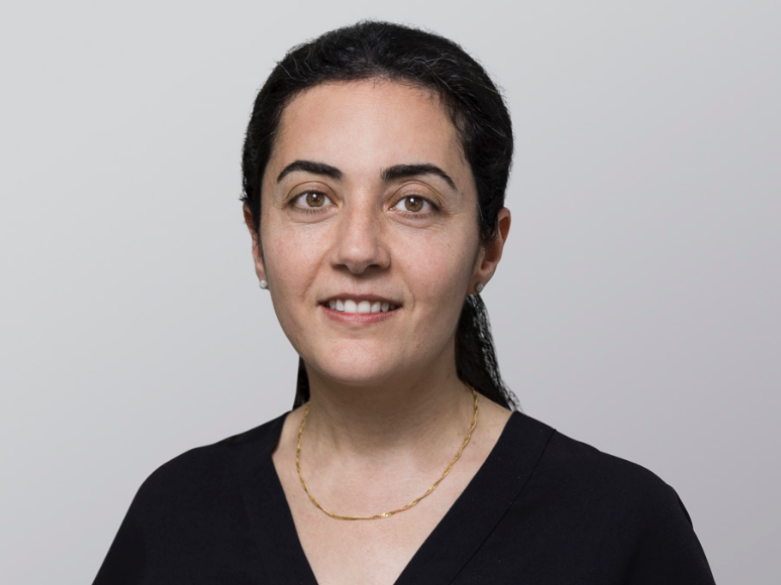Meet the Experts: Biomedical Engineering
The IEEE Victorian Section Young Professionals (YP) Affinity Group is excited to bring a new talk series called "Meet the Experts". Our first session is focused on experts from Biomedical Engineering. This will be a 1 hour virtual event with two distinguished speakers from the Biomedical Engineering field. The speakers will briefly talk about their academic and professional backgrounds and their current work. After the brief introductions, the audience will have the opportunity to ask questions from the speakers.
This event is open to all, but mostly suitable for students, recent graduates, early-career and mid-career researchers and young professionals.
We look forward to having you there!
Date and Time
Location
Hosts
Registration
-
 Add Event to Calendar
Add Event to Calendar
Loading virtual attendance info...
- Contact Event Host
-
For further enquiries, please contact IEEE Victorian Section YP Chair, Dr Anu Sabu at anu_sabu@ieee.org or Vice Chair, Md Abdur Rahman at mdabdur.rahman.1995@ieee.org
Speakers
Dr Susmita Saha
Artificial Intelligence in Healthcare
Biography:
Dr Susmita Saha is a distinguished Research Fellow at the Turner Institute of Brain and Mental Health, School of Psychological Sciences, Monash University. She is the Deputy Director for the Ageing and Neurodegeneration Program at Monash University. She is also working with the iBRAIN group, Department of Neuroscience, as an adjunct Research Fellow. Saha is responsible for leading the analysis of human structural and susceptibility MRI in a rare neurological disease as part of TRACK-FA, a world-first, international multi-modal longitudinal neuroimaging study that aims to identify sensitive, clinical trial ready, neuroimaging biomarkers for Friedreich’s ataxia (FRDA). She is leading several other artificial intelligence (AI) projects utilising TRACK-FA and similar datasets, as a chief investigator and supervising PhD and honours students.
Her research focus is on utilising artificial intelligence (AI) in the healthcare industry, with an emphasis on medical imaging of neurological disorders. Saha has contributed significantly to the field of AI in healthcare by addressing medical challenges using novel machine learning and deep learning techniques, including early prediction of neurodevelopmental disorders in preterm infants and seizure in epilepsy patients to improve their quality of life and reduce the disease burden. She is currently passionate about applying AI to improve the clinical trial design and expedite the drug development for rare neurodegenerative disorders.
Saha obtained her PhD in Biomedical Engineering from the University of Melbourne in 2016. Following her doctoral studies, she pursued two postdoctoral fellowships with esteemed organisations: IBM research Australia and CSIRO. Before embarking on her research career, Saha accrued substantial industry experience with a multinational mobile operator company, as an Electrical and Electronics Engineer.
She is an active IEEE volunteer and is currently the Secretary for the IEEE Victorian Section and Vice-Chair for the IEEE Victorian Section Women in Engineering. She is also a team member for the IEEE R10 (Asia-Pacific) Adhoc Committee on Entrepreneurship and Innovation.

Dr Mehrnaz Shoushtarian
Brain Monitoring to Improve Treatments
Biography:
Mehrnaz Shoushtarian graduated with a PhD in Biomedical Engineering from Monash University. She has worked in both research (Monash Health, Eastern Health) and industry (Cortical Dynamics, Hearing Cooperative Research Centre).
Dr Shoushtarian’s research has focused on measurement and processing of physiological signals using conventional and novel recording techniques and use of research outcomes for development and commercialisation of medical devices. Her main focus at the Bionics Institute involves using functional near-infrared spectroscopy (fNIRS) and other physiological measures, to develop objective measures of tinnitus.
Mehrnaz also has an interest in peripheral sensory stimulation as a treatment for neurological conditions which are characterised by abnormal synchronous activity in the brain (e.g., tinnitus and Parkinson’s disease). She is working on recording brain activity in response to such peripheral stimulation, to better guide optimising stimulation parameters.
Mehrnaz has a great interest in processes needed for research translation. She is part of the Quality Committee at the Bionics Institute and helped implement ISO 9001 Quality Management System across the Institute.
Previously Mehrnaz was Principal Scientist at Cortical Dynamics Ltd, a start-up medical device company, where she was part of a small team that took a depth of anaesthesia monitor prototype through to clinical trials and regulatory approval in Australia and Europe. She also co-led establishment of ISO13485 (Quality Management Systems for Medical Devices) across the company.
Mehrnaz volunteers with the Institute of Electrical and Electronics Engineers (IEEE) and led the Victorian Section, as Section Chair, in 2020-2021. As part of her work with the IEEE, she mentors students and new IEEE Committee volunteers and she is also a mentor for Year 11 students in the ‘Mentoring the Next Generation of Women in STEMM’ program at the Bionics Institute.



